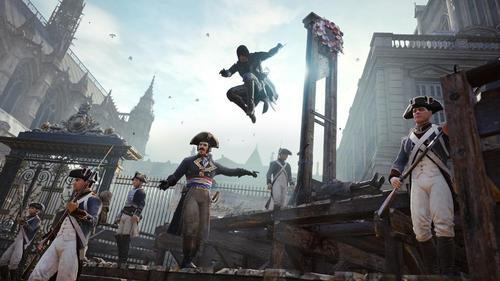
Can you really get too much of a good thing? Assassin’s Creed is aiming to find out.
Game publisher Ubisoft releases a new entry in the stealth series annually, but this year it cranked out two: Assassin’s Creed: Unity for the PC, Xbox One, and PS4, and Assassin’s Creed: Rogue for the PS3 and Xbox 360. That makes eight main Assassin’s Creeds in seven years. The bodies are piling up.
And so are these games, though the critical and commercial success of last year’s pirate-themed Assassin’s Creed IV: Black Flag proved that a little creativity can keep even the most oversaturated series interesting.
This year, though, they might have gone too far.
Unity is the biggest Assassin’s Creed game yet, giving players an almost comically huge version of 18th
century France in which to run amok. Ubisoft repeatedly pointed this
out leading up to its release, touting its incredible crowd-rendering
technology and its skill at harnessing the increased power of the
new(ish) consoles. That’s all well and good, but Unity
unfortunately trades size for stability — and, worse, familiarity for
ingenuity. Despite a few cool new things for aspiring murderers to do, a
bevy of technical glitches and some old, lingering issues stab it in
the back.
You’re Arno Dorian, a young
Frenchman out to solve the mystery of your adoptive father’s murder. As
the latest in a long line of assassins, you ply your trade on the shady
streets of 1790s Paris during the French Revolution, bringing you in
contact with the likes of Napoleon Bonaparte and the Marquis de Sade.
Or at least that’s partly
who you are. You’re also you — yes, you, right there, staring at your
TV — because to keep this game in line with the complicated narrative of
the Assassin’s Creed series, it now pretends that the game
itself is the product of the nefarious Abstergo Industries and that you,
the gamer, are an unwilling helper bee for the historically power-mad
Templars.
It’s an awkward conceit, and for
the most part you’ll forget entirely about the game-within-a-game
thing. Besides, you’re not playing this because of how it ties into the
overarching — and increasingly hard to follow — Assassin’s Creed
plot, which is rife with conspiracy theories, Leonardo da Vinci,
triple-crossing traitors, George Washington, aliens, and now Napoleon
(who maddeningly has a British accent).
You’re playing to scurry up a
building, pick off a guard, survey the land, and dive off into a bale of
hay. That core experience hasn’t changed much over the years, and it’s
front and center here. Unity sadly ditches the pirate ship business that made Black Flag such a wonder, instead landlocking players on an absolutely massive map of Paris.
The city is the game’s real
star. Ubisoft has crafted one of the most breathtaking virtual
environments ever wedged onto a disc. Paris is gorgeous, its
intimidating buildings soaring majestically above the troubled, twisty
streets. Landmarks like Notre Dame, the Louvre, and the Sorbonne are
rendered in astonishing detail, and they’re no longer simply façades.
Many buildings now feature fully explorable interiors. This is a really
big video game, spatially speaking, and at times you’ll just want to
perch on a ledge and take it all in.


No comments:
Post a Comment